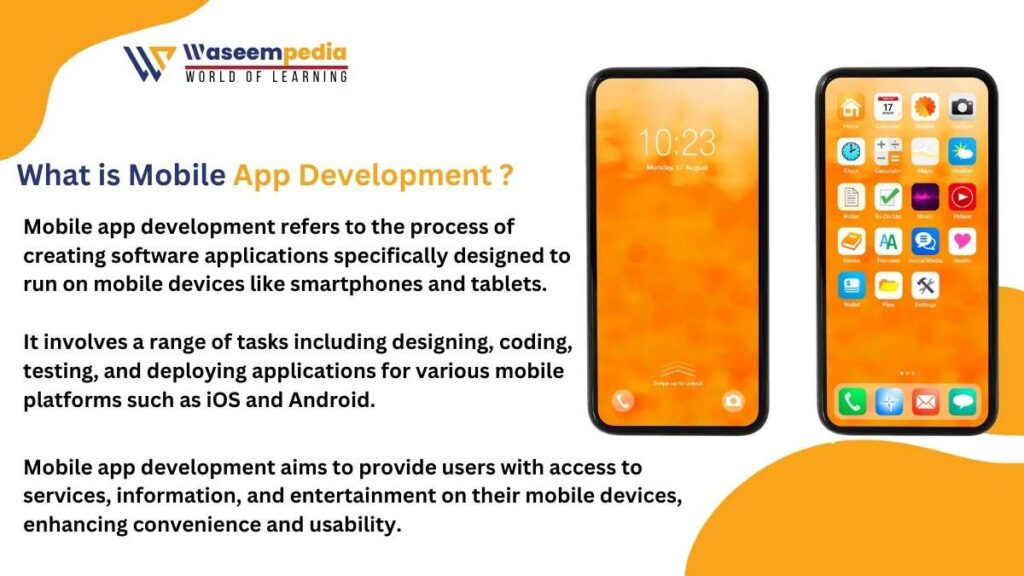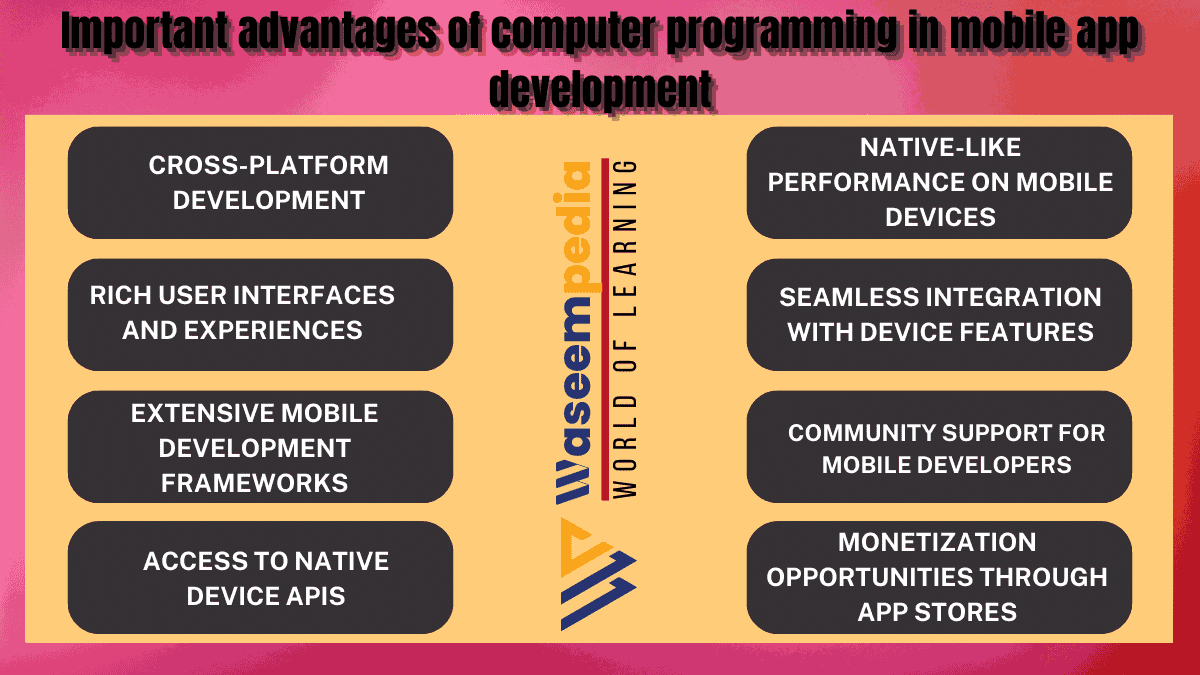The Important Advantages of Computer Programming in Mobile App Development are such as scalability, customization, platform versatility, and enhanced user experiences, enabling developers to create innovative and tailored solutions for various devices and operating systems.
From ensuring cross-platform compatibility to crafting responsive designs, implementing complex functionalities, and facilitating efficient data management, programming is the driving force behind successful mobile applications. As technology evolves, the role of programming in shaping the mobile app landscape continues to be pivotal, offering developers the tools and techniques needed to create innovative and user-centric experiences.
Mobile app development is a rapidly evolving field where computer programming serves as the linchpin for creating innovative and user-friendly applications. This article delves into the crucial advantages that computer programming brings to the table when it comes to crafting mobile apps.
What is Mobile App Development

In the era of smartphones, mobile app development has become integral to our daily lives. Behind the sleek interfaces and seamless interactions lie the intricate codes written by computer programmers. Understanding the advantages of computer programming in this context is pivotal for creating successful and impactful mobile applications.
7 Advantages of Computer Programming in Mobile App Development
There are many Advantages of Computer Programming in Mobile App Development But waseempedia explain the 7 Advantages of Computer Programming in Mobile App Development that are as following:
1. Versatility in App Creation
Support for Cross-Platform Development
Computer programming enables developers to create apps that run seamlessly across different platforms. With languages like React Native and Flutter, programmers can write code once and deploy it on both iOS and Android, reducing development time and effort.
Native App Development for Optimized Performance
For applications demanding optimal performance, programming allows for native app development. Languages like Swift for iOS and Kotlin for Android provide the precision and efficiency needed to create apps that harness the full potential of each platform.
2. User Interface (UI) Design and Experience
User Interface (UI) Design and Experience is a One of the Most Important benefit of programmong in app Development that is as following:
Creating Intuitive User Interfaces
Programming is instrumental in creating intuitive user interfaces. Through languages like Java, Swift, and Kotlin, developers implement UI elements, ensuring a smooth and visually appealing experience for users navigating through mobile apps.
Responsive Design Implementation
Programmers employ responsive design techniques to ensure apps adapt seamlessly to various screen sizes. This responsiveness, often achieved through HTML, CSS, and JavaScript, guarantees a consistent and user-friendly experience on devices of different dimensions.
3. Functionalities and Features
Implementing Complex Functionalities
Mobile apps often require complex functionalities, from real-time updates to interactive features. Programming languages like Python, Java, and JavaScript empower developers to implement these functionalities, enhancing the overall user experience.
Integration of Device Features
Programming allows for the integration of device features. Whether it’s accessing the camera, GPS, or sensors, languages like Swift, Kotlin, and JavaScript facilitate the incorporation of these features, adding depth and functionality to mobile applications.
4. Efficient Data Management
Optimized Data Handling
Efficient data management is crucial in mobile app development. Programming enables developers to implement algorithms that manage data storage, retrieval, and synchronization, ensuring apps run smoothly and respond swiftly to user interactions.
Secure Data Encryption
Security is paramount in mobile apps, especially those dealing with sensitive information. Through programming, developers can implement robust encryption algorithms, safeguarding user data and ensuring privacy compliance.
5. Real-Time Updates and Maintenance
Effortless Rollout of Updates
Programming simplifies the process of rolling out updates. Whether fixing bugs, adding features, or improving performance, developers can push updates seamlessly, ensuring users benefit from the latest enhancements without friction.
Monitoring and Debugging for App Maintenance
Programming skills are essential for monitoring app performance and debugging issues. Through tools and programming languages, developers can identify and address issues promptly, contributing to the long-term health and reliability of mobile applications.
6. App Monetization Strategies
Implementation of Monetization Features
For apps incorporating monetization strategies, programming enables the implementation of features such as in-app purchases, ads, and subscription models. Developers can use languages like Java, Swift, and Kotlin to create seamless and secure payment gateways.
Analytics Integration for Informed Decision-Making
Programming facilitates the integration of analytics tools. Developers can implement tracking mechanisms, providing insights into user behavior and preferences. This data-driven approach aids in making informed decisions for app improvement and user engagement.
7. Testing and Quality Assurance
Automated Testing for Quality Assurance
Programming plays a vital role in automated testing. Through scripting languages and testing frameworks, developers can create automated test scenarios, ensuring robust quality assurance processes and identifying potential issues before an app’s release.
Code Reviews and Collaboration
Programming encourages collaboration through code reviews. Developers can assess each other’s code, share insights, and collectively work towards creating clean, efficient, and error-free applications.
Related FAQ’s
What are 5 key benefits of mobile app development?
Five key benefits of mobile app development include increased accessibility and convenience for users, enhanced brand visibility and customer engagement, potential for additional revenue streams, ability to access smartphone features like GPS and push notifications, and improved customer service and loyalty through personalized experiences.
Which programming is best for mobile app development?
Java/Kotlin: Best for Android app development.
Swift: Ideal for iOS app development.
JavaScript: Widely used for cross-platform development with frameworks like React Native and Flutter.
Objective-C: Used for legacy iOS app development.
C#: Suitable for cross-platform development with Xamarin.
Is programming necessary for app development?
Yes, programming is necessary for app development as it involves writing code to create the functionalities and features of the application.
What are the advantages of mobile app design?
Advantages of mobile app design include improved user experience, enhanced brand recognition, increased user engagement, higher conversion rates, and competitive advantage in the market.
What is mobile app development advantages and disadvantages?
Advantages of mobile app development include increased accessibility, enhanced user engagement, potential for additional revenue streams, ability to leverage device features, and improved customer service. Disadvantages include high development costs, maintenance challenges, device fragmentation, and the need for constant updates to remain competitive.

